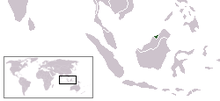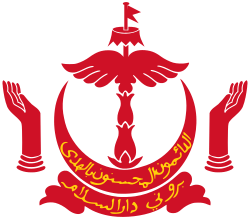LGBT rights in Brunei
| LGBT rights in Brunei | |
|---|---|
 | |
| Same-sex sexual intercourse legal status | Illegal |
Penalty: | Homosexuality is illegal in Brunei and can be punished with death by stoning[1] |
| Gender identity/expression | – |
Lesbian, gay, bisexual, and transgender (LGBT) persons in Brunei face legal challenges not experienced by non-LGBT residents. Homosexuality is illegal in Brunei and can be punished with up to death.
OutRight Action International has described Brunei as "the country that has the most worrisome state of rights for LGBT people in Southeast Asia." LGBT Bruneians feel the need to remain very discreet about their sexual orientation.[2]
The Brunei Project, established in 2015, seeks to promote human rights, including religious freedom, free speech and LGBT rights, in Brunei through social media. The group organised a private community event in 2016, celebrating Brunei's first International Day Against Homophobia event.[3]
Legality of same-sex sexual activity
Prior to 2014, homosexuality was illegal and punishable by up to 10 years imprisonment, regardless of whether the act was done in private and consensual. In 2014, Brunei announced it will begin imposing Sharia law. Homosexuality is punishable with death by stoning under Sharia law.[2][4]
The United Nations has urged Brunei to review its law, which has been described by many media outlets as "medieval", "uncivilized" and "a return to the Stone Age".[2][4]
LGBT people, as well as the Christian and Buddhist minorities, have been advised by international human rights activists to remain discreet in the country. Anyone caught "tarnishing the image of Islam" is heavily punished.[4]
On 11 March 2015, a civil servant was fined $1000 Brunei dollars under the Syariah Penal Code Order for cross-dressing.[5]
Living conditions
The LGBT community in Brunei is very hidden and secret. Bruneian society tends to associate homosexuality with "effeminate men".[6]
In 2011, academics at the University of Brunei made a formal study of gay people in Brunei. The study illustrated how gay people in Brunei chose to remain silent and discreet about their sexual orientation. The researchers were only able to find 29 LGBT respondents, some of whom were foreigners.[6]
In 2014, American reporter Patrick Brzeski reported on the "underground gay scene" in Brunei, with one gay Bruneian man telling him:
Mostly we are discreet and we need to hide our gay identity. We use Grindr, it's very popular. Inside Grindr, Bruneians are careful and choosy. Sometimes people make private parties, mostly gay artists and celebrities in Brunei do that… We just have to follow one rule: Don't put it out there."
Human rights reports
2017 United States Department of State report
In 2017, the United States Department of State reported the following, concerning the status of LGBT rights in Brunei:
- Acts of Violence, Discrimination, and Other Abuses Based on Sexual Orientation and Gender Identity
"Secular law criminalizes “carnal intercourse against the order of nature.” In July Chapter 22 of the Penal Code Order was amended to increase the minimum sentence for such carnal intercourse to between 20 and 50 years’ incarceration. The amendment was primarily applied in cases of rape or child abuse wherein both attacker and victim are male, because existing law covers only assault of a woman by a man. The SPC bans “liwat” (anal intercourse) between men or between a man and a woman who is not his wife. If implemented, this law would impose death by stoning. The SPC also prohibits men from dressing as women or women dressing as men “without reasonable excuse” or “for immoral purposes.” There were no known convictions during the year.
Members of the lesbian, gay, bisexual, transgender, and intersex (LGBTI) community reported unofficial and societal discrimination in public and private employment, housing, recreation, and in obtaining services including education from state entities. LGBTI individuals reported intimidation by police, including threats to make public their sexuality, to hamper their ability to obtain a government job, or to bar graduation from government academic institutions. Members of the LGBTI community reported the government monitored their activities and communications. Events on LGBTI topics were subject to restrictions on assembly and expression. The LGBTI community reported that the government would not issue permits for such events."[7]
Summary table
| Same-sex sexual activity legal | |
| Equal age of consent | |
| Anti-discrimination laws in employment | |
| Anti-discrimination laws in the provision of goods and services | |
| Anti-discrimination laws in all other areas (incl. indirect discrimination, hate speech) | |
| Same-sex marriage(s) | |
| Recognition of same-sex couples | |
| Stepchild adoption by same-sex couples | |
| Joint adoption by same-sex couples | |
| LGBT people allowed to serve in the military | |
| Right to change legal gender | |
| Access to IVF for lesbians | |
| Automatic parenthood for both spouses after birth | |
| Commercial surrogacy for gay male couples | |
| MSMs allowed to donate blood |
See also
Notes
- ↑ Brunei Adopts Penal Code Provision Calling for Death by Stoning for Same-Sex Acts
- 1 2 3 Brunei’s LGBT Community Faces Terrifying Future, The Huffington Post, 15 October 2015
- ↑ Welcome to IDAHOT Newbies !
- 1 2 3 Brunei Returns to the Stoning Age, Daily Beast, 22 April 2014
- ↑ Criminalisation of Homosexuality: Brunei
- 1 2 Gay Life in Brunei
- ↑ BRUNEI 2017 HUMAN RIGHTS REPORT

- ↑ "Archived copy". Archived from the original on 6 April 2015. Retrieved 2014-12-23.
